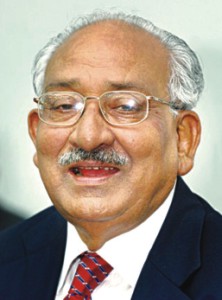 |
Saifur Rahman |
Obituary
Saifur Rahman
Man with the Ripple Effect
Syed Badrul Ahsan
There is little question that Saifur Rahman influenced much of our economic thinking in the last three decades. He was not a political icon. Nor was he a man who could be looked upon as the symbol of government. He was, if you have cause to remember, a chartered accountant who found himself thrust into the hurly burly of politics, found himself, as it were, propping up a military regime he should not have. But since when have men involved with economics observed the fine line separating values from gross realities? From that perspective, Saifur Rahman was a man who focused on the truths he saw shaping up before him. Called upon by General Ziaur Rahman to be part of his government, he saw it as an opportunity to make his own impression on the country.
That was the beginning, in the late 1970s. It was to become, in the course of time, a career constantly lengthening itself into repeated exercises in statecraft, or part of it. Saifur Rahman moved on, after his stint in the Zia and Sattar administrations, to more comfortable conditions in the two governments presided over by Begum Khaleda Zia. You could say that it was in the times of the Begum that he saw his career soar. There were a couple of reasons for that. In the first place, he seemed to be the only man in the Bangladesh Nationalist Party able to articulate economic policy for the party. In the second, Begum Zia reposed absolute trust in him, to a point where he was more often than not a super minister as distinct from those that were his colleagues in the cabinet. If you look back across the years, you just might get the feeling that Saifur Rahman was perennial. He just seemed to be around, ubiquitous as it were. It was always he who walked to the cavernous hall of the Jatiyo Sangsad, his prime minister beside him, ready to give the nation its annual budget. Year after year, he did the job, with unconcealed pride. For twelve years he did it. That is quite a record, even on the global scale.
Saifur Rahman's biggest quality was his plain speaking. His flaw was in believing that he was right and everyone else was wrong. Between these two came that sense of humour, touched with that Sylheti accent that quite disarmed his detractors. The good thing about his demeanour is that he seemed oblivious to circumstances around him. He was not about to change his manners and mannerisms only because he happened to be in the limelight. To him, everyone was tumi. It was not that he was deliberately being condescending to people around him. It was just the simplicity of nature working in him. He perhaps did not remember that some people could and ought to be addressed as apni. He was a gentleman, but on his own terms. But sometimes politeness was thrown to the winds when he bluntly told other ministers that he could not give them the funds they were asking for. The state simply could not afford to fritter away money that could be put to better use elsewhere. Not even the prime minister could contradict him. But when she did try, say the wags, he did not try to hide his irritation.
Saifur Rahman does not have a legacy that others can build on. He was not a great finance minister, but he was one who caused ripples. He was bold enough to realise, before anyone else did, that the market needed to be prised upon, that competition rather than conformity had to be the basis of Bangladesh's economy if the country was to catch up with the rest of the world. As a shrewd player on the political scene, he maintained that the government he was part of was not about to be dictated to by international donor agencies when it was exactly and well into that exercise. He was the first finance minister to tell us that paying taxes was a responsibility. But that came with something else, something of the dark. Much as he railed against corruption, he went cheerfully into helping men with black money paint their ill-gotten wealth white. It is a trap we remain caught in. His successor (that is, if you leave out the finance advisor in the caretaker interregnum) now goes through the pangs engendered by that position.
Saifur Rahman's final years brought with them bagfuls of pain, for him and for the country he thought he had served through the years. A lawmaker son went to prison, another swiftly made his way out of the country. Fingers were pointed at him as well over the wrongdoing allegedly committed in the years in power. Nothing happened. And then politics happened, in new, uncertain conditions. His party reformists installed him as acting leader in the absence of the Begum. He looked happy, almost in the manner of an elder statesman. But the party without the lady was soon proving to be a wasteland. He decided that he had had enough and just went home. And so he redeemed himself. Mannan Bhuiyan was driven into the ground, but Saifur Rahman made a comeback.
In his twilight years, Saifur Rahman grew frail. His gait was slow. The physical pain was proving hard to bear. He called it a day in politics. He had no way of knowing that death lurked somewhere in Ashuganj, or near it. Now that he has passed on, the hard truth of a vibrant presence in national politics gone for good is beginning to sink in.
Copyright
(R) thedailystar.net 2009 |
